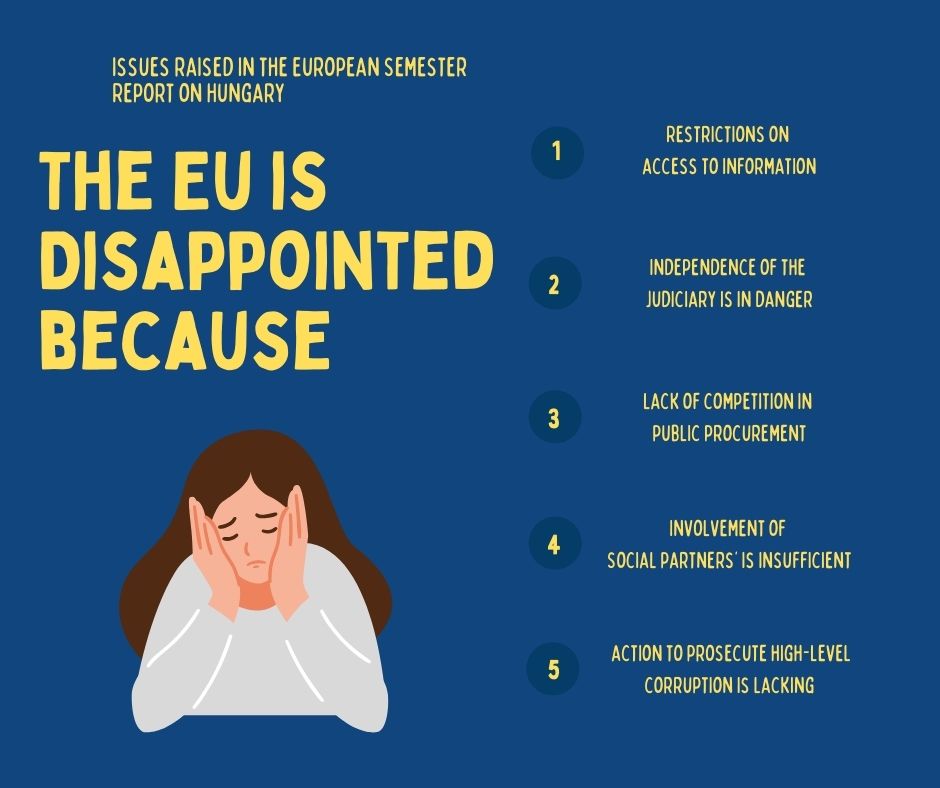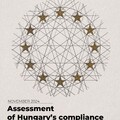Many Member States have already received the first tranche of billions of euros made available from the EU Recovery Instrument, but Hungary's Recovery and Resilience Plan (RRP) has not yet been approved by the EU. It has become clear over the past decade that the only means by which the EU can put pressure on the Hungarian government is essentially through controlling the disbursement of funds. The stakes are indeed high as to what commitments the EU will consider sufficient to give the green light to the Hungarian Recovery Plan.

pic: Euronews
This is a rare opportunity for the EU to enforce meaningful anti-corruption measures that the government would not take on its own. While we do not believe that political corruption in Hungary could be stopped by the EU alone, appropriate measures can be taken to make it more difficult to divert EU funds from the purposes they were meant for. It is also important to bear in mind that the funds to be disbursed after the approval of the RRP could become a source of illegal campaign funding before the elections, for example through supporting the outsourced public interest trusts or investments fostering patronage.
In the summer months, several articles reported that the Commission had extended the deadline for the approval of the Recovery and Resilience Plan (RRP) submitted by Hungary. In practical terms, this means that Hungary will certainly not have access to around a billion EUR in advance from the Recovery and Resilience Facility (RRF), for at least a few more months. This is probably also one of the reasons behind the recent decision of the government to issue a historic volume of USD and EUR bonds in order to pre-finance activities proposed in the not yet approved RRF. The volume of the transaction significantly exceeds the value of the first RRF installment and will likely also cover a variety of pre-election government spending.
In the present analysis, we want to look in particular at the anti-corruption commitments of the latest RRP, and whether they address the problems that the EU has been emphasising for years. Also, we assess the extent to which the planned measures can be taken seriously. This is particularly important as anti-corruption was one of the areas where the Commission expected strong action in the 2019 European Semester Report, notably on prosecution, access to public information, and the independence of the judiciary. Also in the area of anti-corruption, the Commission has called for improvements in the quality and transparency of the decision-making process, including the use of impact assessments and the involvement of stakeholders in the process. In the area of public procurement, the Commission was called on to increase competition and regulatory predictability. These elements are so problematic that the 2020 Country Report highlighted that no progress had been made in these areas. Despite the fact that millions of euros of EU funding for various anti-corruption measures have been spent by the Hungarian state. Some examples:
The specific recommendations of the 2020 European Semester, while much more focused on addressing the COVID crisis, still highlighted the lack of necessary reforms in the following areas:
- Strengthening the independence of the judiciary
- Increasing competition in public procurement
- Reducing corruption, improving access to public information and media freedom, strengthening control mechanisms
- Better action against high-level corruption
The pledges made by the Hungarian government
Both the April draft and the July version of the Recovery Plan include a separate set of measures, i.e. a component designed to respond to these recommendations, called "J – Country-specific recommendations beyond the scope of specific policies" in the earlier draft and "I - Horizontal measures" in the final draft.
It is worth pointing out at the outset that the budget for the whole component in the July RRP is HUF 24.2 billion - less than 1% of the total budget. Of the HUF 24.2 billion, HUF 15 billion alone is allocated for a reform plan that would create an asset management system: essentially, it would account for the IT assets of the public sector, while ensuring their secondary life cycle. This is undoubtedly a useful idea, but it is not even tangentially linked to the country-specific recommendations - perhaps this is what contributed to the renaming of the component as 'Horizontal Measures'.
Unfortunately, even when looking at the other reform proposals, one can still conclude that they hardly serve to implement the recommendations of the European Semester, and in fact, reading the reform proposals, one can often get the feeling that terms from the semester recommendations have been added to the individual components in an ad hoc manner, without supporting their being any connection between the measure and the recommendations.

CORRUPTION
The most revealing in this respect is the package entitled "Further enhancing the effectiveness of the fight against corruption in the area of strengthening the independence of the judiciary", whose evocative title actually covers the two following reforms:
Reform Proposal 1: Modernising the prosecution's cooperation systems to tackle corruption practices.
From the perspective of the RRP's prosecution section, the obstacles to effective anti-corruption action are showcased as consisting of technical and organizational problems. The proposed measure would lead one to believe that the lack of substantive prosecutorial action against corruption is essentially an efficiency problem, and not the lack of commitment. Thus, the development described in the RRP aims to improve communication between departments and institutions through various means of digitalisation, and by making investigations more traceable for senior prosecution officials, as accountability is limited in current procedures. However, it can hardly be expected that the introduction of the two (general and confidential) case management and document management systems identified in the RRP will actually contribute to the effective prosecution of high-level corruption. While the IT upgrade planned for the end of 2024 and summer 2026, estimated to cost 3.6 billion HUF, may indeed be useful for producing up-to-date statistics and potentially speeding up investigations, and will certainly prove to be an improvement compared to disastrously low current levels of digitalization, it has little to do with increasing the prosecution rate of high-level cases. While the issue of efficiency in prosecution has indeed been raised in the recommendations, it has always been raised in the context of tackling high-level corruption: the European Semester recommendations themselves and the 2020 Country Report are quite specific about what they would like to see done in this area:
- There is a lack of action against senior officials and their associates.
- Regarding decisions to close or terminate investigations, accountability is not ensured and there is no legal remedy to challenge such decisions.
Both problems could be addressed by legislative changes in a relatively short time, most notably by creating the aforementioned legal remedy, and other proposals that have been made for example, by GRECO. However, such reforms have been resisted by the prosecution and the government for years, as they would make it much more difficult for the prosecution to hinder indictment in sensitive cases. Without guarantees for the effective work of the investigative authorities, meaningful action against corruption is still not guaranteed, especially as Hungary has not joined the European Public Prosecutor’s Office.
Reform Proposal 2: Eliminating gratuities in the health sector
Even more bogus than the proposal for the reform of the prosecutor's office is the second reform proposal and the measures related to it: in the field of health care corruption - at least as far as the practice where patients are expected to pay gratuity payments to doctors is concerned - has already been largely eliminated by the 2020 law on health care service and the related amendment to the Criminal Code. Thus all the RRP offers on this point is to conduct a public awareness campaign emphasising that gratuity payments should be shunned. HUF 330 million is to be spent on awareness-raising, which would otherwise be warranted. However, framing the campaign to phase out gratuity payments as a response to the recommendations of the European Semester is somewhat farcical, given that these expressly call on the Hungarian Government to introduce comprehensive measures to reduce high-level corruption. This could become particularly absurd if, due to the centralisation of PR campaigns, this money also ends up with the pro-government group of PR companies that, in addition to government propaganda ads, produce campaigns for the entire public sector, and thus would also be responsible for anti-corruption awareness-raising. Of course, we have seen this before.
Interestingly, the draft RRP published back in April also included a third reform proposal, entitled Strengthening the independence of the judiciary. While the topic deserves a separate chapter within the component, the omission of this commitment does little to weaken the proposed measures. All that was envisaged was research into the independence of the judiciary and the dissemination of the results of that research. The set of measures, which hardly deserved to be called reform, has disappeared from the component in its present form – though not without a trace: research on the independence of the judiciary still appears in the chapter of the RRP dealing with meeting country-specific challenges.
TRANSPARENCY
The Commission also expected the anti-corruption framework to be strengthened by improving access to public data. However, the RRP completely fails to meet this criterion. Nevertheless, this is an area with endless potential for development:
- By amending the law, the government could limit the possibilities invoked by some data holders to systematically block access to public data (e.g. in the case of pre-decision data).
- It could abolish or limit the reimbursement of costs for fulfilling data requests.
- It could make the ultimate beneficiaries of private equity funds transparent.
- It could introduce sanctions against institutions that do not publish the information required by the mandatory proactive disclosure lists.
- Most importantly, it could make improvements that proactively enhance the freedom of public information, i.e. make a significant part of public data available through searchable, processable central databases (trending topic: the database of ultimate beneficial owners).
Clearly, the government did not feel it could credibly make any commitments in this area. After all,
- It has recently amended the Fundamental Law to restrict the definition of public funds, and thus limit the scope of data available to the public.
- It regularly enacts laws that prevent access to public data in certain sectors and cases (e.g. the Budapest-Belgrade railway line, the Mátra Power Plant).
- Certain ministries sometimes fail to disclose public data despite court decisions requiring them to do so.
- Even after the epidemic subsided, the rules allowing individual data holders to respond to data requests with a delay of up to 90 days remained in place.
- The government has been postponing for years the creation of the transparency portal for which it received funds from the EU many years ago, as part of its anti-corruption commitments in the previous 7-year cycle. The plan does not even dare to make a passing reference to it.
PUBLIC PROCUREMENT
The government's desire to please the EU can most clearly be perceived in the case of the two reform proposals concerning public procurement. Both issues have long been the subject of criticism, and the responses offered reflect some of the proposals made by researchers and civil society in recent years.
Reform Proposal 3: Further developing the Electronic Procurement System (EKR)
The planned development of the EKR - which in fact means nothing more than the possibility of mass export of public procurement data in the future - is a new addition to the programme, and K-Monitor has been calling for its introduction for some time. This commitment, if implemented in a meaningful way, will mean that the most important public procurement data shall be published by the government at the database level, in a raw and processable format. Currently, this data is only available on a procedure-by-procedure basis, one by one, through multiple queries. As the RRP recognises, data-based processing of the scoreboards may be important not primarily for NGOs monitoring public procurement corruption or the press, but for policy makers, researchers, and market actors analysing public procurement. The only question is why the government would schedule more than a year for such a relatively simple development - the target date for its completion being autumn 2022. This is puzzling, not least because the RRP does not allocate any funds (!) for this reform.
Reform Proposal 4: Strengthening the contracting authority and tenderer sides, elaborating measures to improve competition
The most ambitious set of measures is the 4th reform proposal on public procurement, which sets out measures around two main objectives: on the one hand, to increase competition in the public procurement market and, in this context, to encourage the participation of SMEs. It should be noted that the draft does effectively concede that the EU's criticisms of the public procurement system were valid, such as the disavowal of the high number of procedures without real competition. In addition to research, surveys, and methodological work, the planned measures include the development of specific practical guidelines and plans to amend legislation, for example, to require prior market consultation in certain sectors and to only declare a winner in public procurement procedures if at least two bids have been received. The plan would increase SMEs' willingness to participate through training and campaigns, as well as through tax incentives and reimbursement for public procurement costs.
Even if these reforms carry certain risks, they have the potential to make a real contribution to meeting the challenges set by the European Semester, if properly implemented. However, from the point of view of anti-corruption, the draft is deficient in that, although it recognises the importance of the issue, it does not contain measures or proposals for cases where the contracting authority has an interest in restricting competition, for example when it deliberately colludes with bidders: a well-known example of this is when a public institution or local authority asks the winning bidder to “bring along” a few more bidders.
We would therefore welcome, in addition to the above commitments, others that might:
- Ensure the true independence of the Public Procurement Arbitration Board,
- Allow for simpler and cheaper reviews for (losing or excluded) bidders than the current remedies.
- Call upon the Public Procurement Authority to introduce algorithmic risk-assessment tools in addition to the existing complaint handling mechanisms (the use of the ARACHNE tool is mentioned in the plan, along with other measures to ensure the integrity of funds management).
- Ensure that private beneficiaries of EU funds fall under the same procurement rules as public bodies.
- Encourage Contracting Authorities to make their purchases available, preferably in small lots, to a wide range of tenderers.
- Only projects should be reimbursed by the EU that were conducted under reformed public procurement rules.
PUBLIC SERVICES AND DECISION-MAKING
The next set of 5 reform proposals concluding the RRP can hardly be described as anything more than also-rans, as most of the measures involved are not even tangentially related to the recommendations of the Semester. They are rather linked to governmental ideas and projects that are already underway, wrapped in RRP-compatible packaging in an attempt to secure EU funding.
The 5th reform proposal bears the grand title "Simplifying the tax system". It is hard not to think that the package of measures was thus entitled to resonate with the 2019 European Semester recommendation to "Continue simplifying the tax system and strengthen it against the risk of aggressive tax planning". However, it may be disappointing to read the content of the measure, which is merely the phasing out of the utility tax - while in Hungary, according to some aggregations, there are still more than 50 different types of tax over and beyond the utility tax. The Government has therefore undertaken a rather modest reform, especially as the abolition of the utility tax had been broached several times before - if only because a large part of the utility network is owned by the state or municipalities anyway. Of course, we cannot ignore the fact that newly acquired interests (Tigáz and E.ON Tiszántúli Áramszolgáltató Zrt.) of Lőrinc Mészáros, an oligarch closely tied to the PM, are also significant utility tax payers.
The draft does not say a word about curbing tax planning (although the Commission specifically states in its Country Report and recommendations that it would welcome the introduction of a withholding tax on income flowing to offshore havens) or dismantling the corporate income tax (“TAO”) benefits, which still allow for widespread abuse.
Reform Proposal no. 6, Supporting Data-driven Decision-making and Legislative Process to Increase Efficiency and Transparency and Reduce the Risk of Irregularities. The 'reform', discussed in about half a page, covers little more than supporting lawmaking with infographics and data visualisation tools - which are intended to help citizens understand the purpose, content, and impact of legislation. It is outrageous that the RRP would use this communication measure - for which it intends to spend HUF 1.63 billion - to achieve a higher level of public participation in lawmaking, stakeholder involvement in decision-making, transparent lawmaking, and social dialogue called for in the European Semester.
Outside the EU, many domestic NGOs and event authorities such as the National Authority for Data Protection and Freedom of Information (NAIH) have also severely criticized the government for the fact that the consultation of legislation has essentially ceased. Furthermore, important materials that fundamentally affect their operations are sent to stakeholders with unacceptable deadlines. There are numerous recent examples of where stakeholder involvement in the legislative process was, in fact, scandalous, such as the adoption of the law on employment terms in the health service, where the Hungarian Medical Chamber was given 3.5 hours (!) to form an opinion on the bill, and stakeholders had to make life-changing decisions without even having access to the draft detailed rules in time. One does not need to go even that far; it is enough to be reminded of the public consultation on the RRP itself: as pointed out above, citizens and even the authorities consulted (e.g. the State Audit Office of Hungary) were only allowed to give their opinion on a completely different plan from the one that ended up on the Commission's table, and the plan currently awaiting adoption in Brussels was not submitted for public consultation.Of course, a reform with the core committment that the government will from now on comply with the law and ensure social participation in lawmaking and public policy-making would sound rather strange. If the government wanted to make a meaningful commitment in this area, it would, for example, make the entry into force of legislation conditional on certain guarantees of participation and consultation. In addition, genuine reform could also prohibit the passing of omnibus bills (enforcing the single-subject rule instead), so that problematic amendments cannot be sneaked in hidden in unrelated legislation, or could also make individual MPs' motions subject to public consultation.
In the framework of the next Reform Proposal (no. 7, Extension of the automated administrative decision making system to increase efficiency and transparency and reduce the risk of irregularities), the Government would extend the automated administrative decision making (AADM) system to three new types of cases: naturalisation, land registry and motor vehicle administration. This should not come as a big surprise either, as the extension of automated administrative decision-making (AADM) has been a long-cherished plan of the government, so much so that the Ministry of Interior has already received EU funding for the development of AADM models from the 2014-2020 budget cycle, and it would also be one of the elements of Hungary's Artificial Intelligence Strategy. We certainly welcome the fact that the RRP believes that automated decision-making would be based on transparent algorithms (K-Monitor and its partners have previously argued in several research papers that transparency of government algorithms is a very important requirement), and we can also agree that the introduction of automated decision-making could contribute to reducing low-level corruption in these areas. At the same time, we think it is presumptuous for the government to try to sell this reform as an "increase in transparency" - if only because it is clear that the transparency requirements set out in the European Semester did not apply to the administrative affairs of individual citizens, but to access to public data. It is also striking that the Government does not seem to be in any hurry to introduce the system: automated administration is scheduled for implementation as far as in the fourth quarter of 2024.
Reform Proposal 8 has already been mentioned: the measure, entitled Strengthening the national IT asset management system to improve the efficiency of public services, essentially involves the management of the entire public sector IT asset system (including software) - the new system would register assets, support procurement and ensure that the lifecycle of assets is used to the fullest. This single reform represents 60% of the overall component budget, despite the fact that it cannot be linked to the European Semester recommendations at all - even the Government has not bothered to do so. Looking back at the continuing expansion of IT companies close to the government, it is not impossible that the money has already been doled out.
Finally, we should mention the new element introduced in the latest RRP in July, Reform pledge no. 9, which covers the implementation of the Recovery and Resilience Plan itself. Although it is presumed that the RRP would be implemented even if it were not accompanied by a separate set of measures, our impression is that it is the anti-corruption elements linked to the implementation of the plan that have led to the listing of this topic under the heading of a separate reform pledge. While this is the very topic that received the briefest coverage in the entire RRP, it is clear that the reform proposal includes four specific commitments with a relatively short deadline of a few months, namely
- Adopting an Anti-Fraud Strategy,
- Adopting an Anti-Corruption Policy
- Issuing a Government Decree on the basic rules and institutions for implementing the RRP, and
- Setting up a monitoring system.
It is not included in the RRP, but the implementing regulation was adopted by the Government in July - but we don't know much more from the reform description itself. However, there is a separate chapter in the RRP which deals in detail with the implementation and monitoring of the RRP. However, it must be emphasised that these measures ultimately relate only to the RRP and the use of funds derived from the RRF, without the Anti-Corruption Policy or the Anti-Fraud Strategy in any way constituting a comprehensive anti-corruption programme.
Even though a large share of the reform proposals formulated contain many relevant measures despite their shortcomings, the RRP as a whole only responds to a fraction of the problems identified in the European Semester reports, and completely fails to address the most severe problems of corruption and the rule of law. Moreover, we have doubts about the seriousness of the commitments made. Not only because the government has so far disputed the legitimacy of the EU's criticisms, but the deadlines for implementing the commitments are in many cases so far away that they do not represent any commitment for the Hungarian government in its present term. It is also telling that the government has packed several measures into the plan that it has already decided on or is already funding from other sources, so they are not really new commitments. It remains to be seen whether all of this will be sufficient to get the money pump started or whether the Commission will demand taking additional measures to protect public funds.
Translation: Bálint Pinczés
K-Monitor strives against corruption and promotes the transparency of public spending in Hungary. Support Us!
Címkék: english
Szólj hozzá!
A bejegyzés trackback címe:
Kommentek:
A hozzászólások a vonatkozó jogszabályok értelmében felhasználói tartalomnak minősülnek, értük a szolgáltatás technikai üzemeltetője semmilyen felelősséget nem vállal, azokat nem ellenőrzi. Kifogás esetén forduljon a blog szerkesztőjéhez. Részletek a Felhasználási feltételekben és az adatvédelmi tájékoztatóban.





